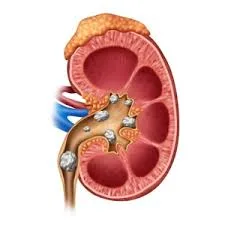Kidney stones, or renal calculi, are hard deposits made of minerals and salts that form inside the kidneys. (6 Effects of Carbonated Drinks on the Kidney). These stones can vary in size, ranging from a grain of sand to a golf ball, and can cause excruciating pain when they move through the urinary tract. Understanding what causes kidney stones is crucial for prevention, as well as for managing symptoms if they do develop. Several factors can contribute to the formation of kidney stones, including dietary choices, lifestyle habits, certain medical conditions, and genetic predispositions.
1. Dehydration
One of the most significant causes of kidney stones is dehydration. When a person doesn’t drink enough water, urine becomes more concentrated with minerals and salts, which can lead to the crystallization of these substances in the kidneys. Staying hydrated helps to dilute urine, which in turn can reduce the concentration of stone-forming substances.
2. Dietary Factors
Certain dietary choices can increase the likelihood of developing kidney stones. High salt intake, for instance, can elevate calcium levels in urine, making it easier for stones to form. Additionally, a diet high in animal proteins like meat, fish, and poultry can raise uric acid levels in the body, leading to the formation of uric acid stones. Foods rich in oxalate, such as spinach, nuts, chocolate, and certain fruits, may also contribute to the formation of calcium oxalate stones in individuals susceptible to them.
3. Genetics
A family history of kidney stones increases the risk of developing them. Specific genetic conditions, such as cystinuria, affect how the body processes amino acids, leading to the formation of cystine stones. Genetic predispositions can also affect how calcium and other minerals are processed in the body, increasing the likelihood of stone formation.
4. Obesity and Metabolic Syndrome
Obesity and related metabolic conditions, like diabetes and hypertension, are associated with an increased risk of kidney stones. Obesity can lead to changes in the acid-base balance of the urine, creating an environment conducive to stone formation. Insulin resistance, a hallmark of metabolic syndrome, can alter how the kidneys process calcium and uric acid, both of which are linked to stone formation.
5. Medical Conditions
Certain medical conditions can increase the risk of kidney stones. Hyperparathyroidism, for example, causes the body to produce excess calcium, which may accumulate in the kidneys and form stones. Similarly, people with chronic urinary tract infections are at higher risk of struvite stones, which are composed of magnesium and ammonia and often develop in response to bacteria. Other conditions, like Crohn’s disease and inflammatory bowel disease, can increase the absorption of oxalate, raising the risk of calcium oxalate stones.
6. Medications
Certain medications can contribute to the formation of kidney stones. Some diuretics can increase calcium concentrations in urine, while antacids containing calcium, when taken in excess, can also increase calcium levels. Additionally, drugs like topiramate, commonly used for epilepsy and migraines, have been linked to an increased risk of kidney stones.
7. Low Urine Volume and High Mineral Concentration
Low urine volume is a significant factor in stone formation. When there is not enough urine to dilute the minerals, these minerals can start to crystallize and form stones. Conditions that lead to low urine volume, such as excessive sweating, hot climates, and lack of fluid intake, can all contribute to stone formation.
8. Lack of Citrate in Urine
Citrate, a natural inhibitor of stone formation, binds with calcium in the urine, preventing it from combining with oxalate to form stones. Individuals with low levels of citrate, a condition called hypocitraturia, are at a higher risk of developing calcium stones. Some diets or conditions can lower citrate levels, such as high protein intake and metabolic acidosis.
Preventing Kidney Stones
Preventing kidney stones primarily involves managing the factors that contribute to their formation. Staying hydrated, maintaining a balanced diet low in salt and high in fruits and vegetables, and reducing the intake of stone-forming foods can help reduce the risk. Regular exercise and weight management can also contribute to a lower risk of stone formation.
In conclusion, kidney stones are caused by a combination of genetic, dietary, lifestyle, and medical factors. By understanding and addressing these factors, individuals can significantly reduce their risk of kidney stones. If you suspect you are at risk, consult a healthcare provider who can offer guidance tailored to your specific needs.


